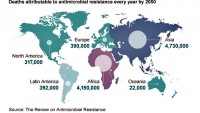Terrorism and The Cloud: What You Need To Know
| John Curry | | Jun 04, 2016 08:25 PM EDT |
Recent terrorist attacks in Brussels, Turkey and Paris, make for attention grabbing headlines. However, the truth is, violence and chaos are at all-time lows globally overall. Crime rates in the United States and in most other Western nations have nose-dived. Meanwhile, the standard of living for developing nations is improving.
Like Us on Facebook
With that said, threats to our property and personal safety will always exist in some fashion. Caution and security ought to always be factors in the way we manage ourselves as nations, enterprises, and people. It's a matter of risk-assessment: figuring out where the most likely point of attack will come, the motives behind it, and who is ultimately responsible.
To this end, few components of contemporary life seem as vulnerable as our computer networks and cloud management systems - the backbone of modern civilization. Terrorist organizations are increasingly interested in attacking their enemies on the virtual front in addition to their trademark acts of violence.
The current proliferation of multi-device mobile access to the Internet has introduced a whole new host of avenues for terrorists to take in the pursuit of cyber attacks. Individuals, businesses, and government bodies are turning to cloud security precautions designed to protect the otherwise incredibly porous barrier between unauthorized users and their online targets. This has shown to be vastly effective at countering cyber attacks, but "one-and-done" steps to prevent terrorists from breaking into restricted web-based digital space are not enough. Constant monitoring and adaptation to new threats are key.
This is thanks in part to the new age of so-called nation-states participating in what can only be called cyber terrorism. The Islamic State, which has claimed responsibility for the bombing attack in Brussels, also has the means to fund sophisticated cyber attacks on their enemies.
However, the online antics of ISIS are nothing new. Russia, China, North Korea, and yes, even the United States, have participated in cyber attacks against enemy nations and organizations. However, these "attacks" have historically boiled down to little more than corporate espionage and old-fashioned spying. The "new age" of cyber attacks, financed by sophisticated organizations including terrorists, threaten more than just business interests and state secrets.
Transportation infrastructure is consistently on the top of the target list for physical and cyber terrorists around the world. Preventing a nation's airlines, trains, or car traffic management systems from functioning property has the potential to shut huge swaths of the economy down. Though so-far unmet on a grand scale, government agencies have already devised considerations, contingencies and response scenarios in case these systems are ever shut down by malicious means.
Communications is another go-to for terrorists interested in disrupting a targeted society. Close down our means of relaying information to one another in an age when everyone is nearly constantly connected to everyone else, and things are sure to get a little crazy in the streets. Once again, most nations have devised plans in the event such an attack were to ever occur.
Healthcare systems are also highly prized points of attack for cyber terrorism. Hospitals and other medical facilities around the world are increasingly dependent on digital data sharing via cloud computing and other forms of rapid file sharing. Disrupt this flow and lives may be on the line.
All of this may seem relatively benign in comparison to the threats of physical violence posed by modern terrorist organizations. However, it's the combining of digital sabotage with real-world attacks which "next-gen" terrorism desperately seeks to achieve. Imagine 9-11, the Paris attacks of 2015 or the attacks in Brussels just recently, happening in conjunction with downed transportation, communication, and healthcare infrastructure?
Alas, remember the original point: the world is far less frightening than the media at-large would have us believe. Terrorism, for all its horrors and devastating impact on society, is not something the average person will be affected by in their lifetime. The same goes for violence in general.
However, upticks in relative safety will never completely remove evil from the world. As humanity becomes ever more dependent on computers and digital data to function, risk assessment must adapt in order to illuminate the ways in which wrongdoers will use technology to their advantage.
©2015 Chinatopix All rights reserved. Do not reproduce without permission
EDITOR'S PICKS
-

Did the Trump administration just announce plans for a trade war with ‘hostile’ China and Russia?
-

US Senate passes Taiwan travel bill slammed by China
-

As Yan Sihong’s family grieves, here are other Chinese students who went missing abroad. Some have never been found
-

Beijing blasts Western critics who ‘smear China’ with the term sharp power
-

China Envoy Seeks to Defuse Tensions With U.S. as a Trade War Brews
-

Singapore's Deputy PM Provides Bitcoin Vote of Confidence Amid China's Blanket Bans
-

China warns investors over risks in overseas virtual currency trading
-

Chinese government most trustworthy: survey
-

Kashima Antlers On Course For Back-To-Back Titles
MOST POPULAR
LATEST NEWS
Zhou Yongkang: China's Former Security Chief Sentenced to Life in Prison

China's former Chief of the Ministry of Public Security, Zhou Yongkang, has been given a life sentence after he was found guilty of abusing his office, bribery and deliberately ... Full Article
TRENDING STORY

China Pork Prices Expected to Stabilize As The Supplies Recover

Elephone P9000 Smartphone is now on Sale on Amazon India

There's a Big Chance Cliffhangers Won't Still Be Resolved When Grey's Anatomy Season 13 Returns

Supreme Court Ruled on Samsung vs Apple Dispute for Patent Infringement

Microsoft Surface Pro 5 Rumors and Release Date: What is the Latest?













